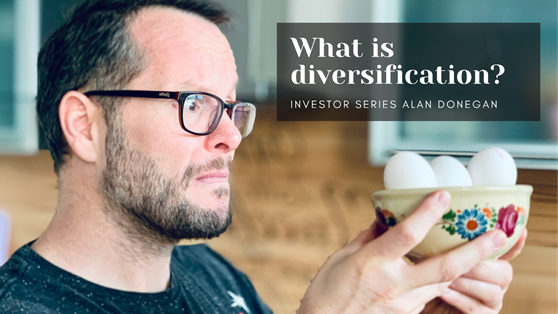|
Back to Blog
What is diversification? Investor Series9/11/2020
He worked for a multi-national logistics company in aviation. His area of expertise was airlines. So he had taken his money and invested it into airlines, aviation and travel companies. In March 2020 when Covid-19 knocked the stock market sideways his stocks plummeted. When the stock market recovered in May; his stocks didn't. He had the opposite of a diversified portfolio!
What is diversification? How do you do it? Is investing in one thing diversified? First Written 09/11/2020. Updated 01/06/2021
Disclaimer: This is not financial advice. Katie and I are not trained financial advisors, nor do we pretend to be one online. Read our full disclaimer here.
The opposite of diversification
The extreme opposite of diversification is to pick one company that you believe in and to invest your entire fortune in that company. This is a highly risky strategy as the fate of your investments are directly linked to the fate of that one company. If it grows and makes money then so do you; if it tanks or goes bankrupt you lose everything!
People get so fanatical about certain companies like Apple or Tesla and they bet their entire retirement pot on those businesses! This would scare the s!#t out of me! Tesla has been a good bet so far, but it has been a rocky road. Who knows what will happen next!
My friend had diversified beyond one company but he had only invested in one industry sector; aviation. In the March 2020 stock market crash, aviation was hit hard! Over the months since lots of companies went bankrupt, people stopped travelling and tourism was shut down for most of the year.
The economy as a whole bounced back in May and June with the market reaching a new high, however, aviation has not recovered at all. Pharmaceutical, technology, financial, utilities all recovered and started to grow again but the aviation industry and tourism is still in trouble as I write this post. It is now June 2021 and we are expecting a tourism explosion as lock down lifts but who knows when that will be? Vaccinations are taking effect but a third wave through the Indian variant is on the cards. Some reports have said that it will take up to five years for the aviation industry to recover properly. Technical definition: diversification
Here is the technical definition of Diversification from Investopedia (don't worry if you don't understand some/all of this, I have my own plain language definition for you afterwards!):
"Diversification is a risk management strategy that mixes a wide variety of investments within a portfolio. A diversified portfolio contains a mix of distinct asset types and investment vehicles in an attempt at limiting exposure to any single asset or risk. The rationale behind this technique is that a portfolio constructed of different kinds of assets will, on average, yield higher long-term returns and lower the risk of any individual holding or security." It is always annoying when you have to look up half the words in the definition of a word isn't it! More on financial language in another post soon! Let's try and make this simpler: Alan's definition of diversification: Investing your money into a broad range of assets to reduce the risk of failure/bankruptcy/world events wiping out all your investments! Diversification means you don't put all your money in one industry or place. It is spread over lots of different assets. You have heard the saying "Don't put all your eggs in one basket"? Diversification is having many baskets and many eggs and some bacon, tomatoes, mushrooms as well! I love a good breakfast analogy. How Katie and Alan diversify
Katie and I buy broad based index funds (more on what this means in a later post). Specifically the ones from Vanguard. They have very low fees and spread our money over industry sectors, company size and geography!
Katie has been geeking out visualising where our investments are and has created some amazing charts and graphs for us! Let's first look at geography. Chart Warning Katie's charts are interactive so you can zoom in or however over the different sections to see what they are. They are going to be best viewed on a laptop or tablet and in full screen mode. So open then up, click around and zoom in and out to get the full experience!! Most of our money is invested in the Developed World Ex. UK Vanguard index fund. We hold a tiny amount of two other funds FTSE UK all share and the US equity index. The map below shows how our investments are spread around the world! The darker the colour the more money we have invested in stocks in that country.
We have 66.2% of our money invested in America (we are comfortable with that as most of those businesses are global businesses anyway like Google, Amazon, Microsoft), 7.4% in Japan, 6.2% invested in the UK, 1.9% in Australia and many more countries.
Buying these index funds spreads our investments around the globe. We don't have all our money invested in one country so if, for example, the UK suffers because of Brexit then we are not as exposed to that individual risk! The second way we are diversified within these funds is across industry sectors. The chart below shows how your money is split across different sectors if you buy the Developed World ex. UK fund from Vanguard.
This bubble chart shows the same information just in pretty circles. YAY data. The bigger the circle the more of that industry is in the fund.
We have 23% invested in Technology, 16% in consumer products, 14% in industrials and so on. We feel confident that we are not invested in just one industry unlike my aviation friend!
So if you buy a broad based index fund like the Vanguard Developed World ex. UK your money is split across all of the major industry sectors in proportion to the size they are in the market. You will be pleased to hear that the Donegan funds are nicely diversified across geography, sector and company size! Yay for us! Why should you care? Why diversify your investments?
Diversification is important to protect your investments. The hope (and I hate the use of the word hope but it is exactly that) is that if one country suffers then another will do well, if one sector does badly another will thrive, if one asset class does badly another one will perform.
The financial crisis in 2008 hit everyone really hard and it didn't matter how diversified you were, you would have lost money (this loss was only on paper unless you sold and crystallised the loss!). However, the market bounced back and your investments grew back if you just waited and if you were diversified by investing in broad based low cost index funds. If you had been invested just in the financial sector or just in real estate in 2008 you would have been in a lot more trouble! Why diversify? It offers you some protection from major market events, individual sector challenges and company issues such as bankruptcy. In my opinion it is critical in protecting your investments from industry and company failure and helping you to partake in an expanding global economy. Katie and I would not invest any other way! Ways to diversify
How can you diversify your investments? There are so many ways! This doesn't make it easy for us to implement this stuff; it creates the paradox of choice. The paradox of choice states that the more options there are the harder it is to make a decision. There is however a SUPER easy way to diversify which is by investing in index funds. It always amuses me that by investing in one simple thing I am doing the opposite and diversifying!
Four ways to diversify your investments The first way to diversify is across asset classes. You can take your money and invest it across real estate, stocks and shares, bonds, commodities and cash. Katie and I own some investment properties (which we are trying to sell) and stocks and shares. Interestingly by owning a simple index fund you will be investing in these other asset classes too as the fund includes property businesses, commodity businesses and more. The second way to diversify is across industry sector. When you buy stocks and shares don't just buy airlines like our friend from earlier; buy technology, finances, health, retail and all the sectors. You can see the chart above for how our money is split across sectors. By buying a broad based index fund you automatically invest in multiple sectors. The third way to diversify is across geography. Don't just buy American companies or British companies, buy stocks and shares from around the world. If Europe is having a tough time then we hope that your holdings in Asia will perform instead. The opposite of this is what is know as Home Country Bias. This is where people tend to invest only in the country they they live in. For example British people invest in just the UK firms or the Americans invest in only American firms. The simplest way to diversify across geography is to buy a global index fund that mirrors the weighting of global markets. Vanguard has a fund called the FTSE Global All Cap Index Fund which invests in 56 different countries around the world. This is a different index fund to the one that we own. Look out for future articles on the differences between these two index funds and how to choose which fund to buy. This next chart shows you how your money would be spread around the world if you invested in the Vanguard FTSE Global All Cap Index Fund. If you are on your phone reading this make sure to get your tablet or laptop out when you get home to get the full chart experience!
The fourth way to diversify is to buy different size companies. Don't just buy the giants like Apple and Amazon; buy a range of small company shares as well so that your money is split over a range of different size companies. In financial speak company size is referred to as market capitalisation (Market Cap). This is the total value of the company and is calculated by multiplying the number of shares by the share price.
In investing when they talk about large cap they are referring to companies with a large market capitalisation or value. Medium cap is medium companies and small cap is small ones. There aren't any defined industry standards as to the $ or £ amount that these sizes refer to but it gives you an idea. When you invest in the Vanguard FTSE Global All Cap Index Fund you are getting nearly 7,000 companies of all different sizes (market caps) from around the world. I LOVE this next chart that Katie created to show the size of investment in different countries and companies around the world in the global fund as at September 2020. Dark blue are American companies and you can see the top left hand corner box is Apple. By investing in this fund 3.25% of your investment is put into Apple stock. The size of the box represents the amount of your money that will be invested into this single stock. By hovering over the graph you can see which company each box represents and what percentage of your money is held in these different companies.
What I really hope you will take from this last chart is just how spread around the world your money is if you buy one of these index funds. You will be invested across sectors, companies and countries around the world.
I had so much fun last night playing with this. Katie and I are in Germany at the moment and we were able to zoom into the chart, find Germany and see exactly which of the German companies we owned!!! What else are you going to do on a Sunday in lock down?? Take some time to explore the chart and look up some of the companies. By doing this you will start to get a better understanding of what an index fund actually is and where you money is invested if you buy something like this! Myths of diversification
Let's tackle some of the myths of diversification. These downsides of diversification are lifted directly from the Investopedia website. They are absolutely worth considering but I wanted you to see just how untrue they could be!
1. Diversification is time consuming This depends how you do it! Katie and I invest in one simple Vanguard Index fund and feel like it is less time consuming to diversify this way than it would be to be a stock picker. 2. Diversification is costly The belief here is that it costs more to have a broad range of investments spread about. The truth is: it depends how you do it! The Vanguard index funds are some of the lowest cost investments you can hold. Want to know more about fees? Read our article entitled it's only 1%! 3. Diversification limits short term gains To explain why they believe this here is a paragraph from the diversification article directly from the Investopedia website: "Say you've invested $120,000 equally among six stocks, and one stock doubles in value. Your original $20,000 stake is now worth $40,000. You've made a lot, sure, but not as much as if your entire $120,000 had been invested in that one company. By protecting you on the downside, diversification limits you on the upside—at least, in the short term. Over the long term, diversified portfolios do tend to post higher returns." In my opinion the paragraph above is a VERY DANGEROUS way to think. The paragraph states that I am likely to be able to just pick the one stock that is going to double and then I should put all my money into that one! This is hugely risky and I have experienced the pain of stock picking when it goes wrong first hand. There are very few people in the world that can successfully pick stocks and unless you have been reading company reports for 10-12 hours a day for the last ten years I would not recommend it! From what I have experienced and seen this way of thinking is the quick fire way to losing money! What's next
Katie and I have been having a huge amount of fun creating these charts and articles about investing for you. After we ran the Take Control of your Finances course for the first time; the biggest thing people said was missing was advice of how to choose an index fund. This is the first article in a series that will make that far easier for you to do! The full Investor Series is going to be:
Katie and I are going to be working on this series over the coming weeks. Make sure you are on the mailing list below if you want to stay up to date or if you want to find out about the Rebel Finance School Course! We write these articles for you. As we write and create the charts it deepens our knowledge of investing but the true purpose is to help you! If you have any questions, if you are still confused then please write us comments below and we will make sure we answer and develop the article further! Love Alan and Katie |
DONEGAN |
We built this website to share our stories, the adventures, the amazing people and all the life lessons we've learned along the way!
SIGN UP to our mailing list
|

 RSS Feed
RSS Feed



